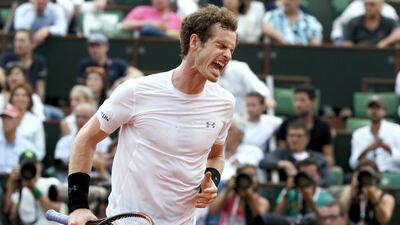Andy Murray must be getting pretty sick at the sight of Novak Djokovic these days.
The Scot has faced off against the world No 1 four times in 2015, at four of the biggest tournaments on the calendar, and he has lost all four matches: the final of the Australian Open, the semis at the French Open, and in the final and semis of Miami and Indian Wells.
Only two other men have beaten Murray in the first six months of this year – Borna Coric in Dubai and Gilles Simon in Rotterdam.
Djokovic aside, his record against the rest of the world top 10 is 6-0 with two wins against Tomas Berdych and one each over Rafael Nadal, Kei Nishikori, Milos Raonic and David Ferrer.
Murray’s record against Djokovic is the only black mark on what has been one of the best starts to a season for the two-time grand slam title champion and world No 3.
But Murray has lost eight on the trot against Djokovic and Boris Becker, the Serb’s coach, thinks the 2013 Wimbledon champion’s habit of chastising himself, and often his coaching team, is holding him back.
“Murray is honest, but in a negative way,” Becker told the Daily Mail. “I’ve never seen a guy – not even John McEnroe – who commentates on every single point the way Murray does. It’s mind boggling how much he speaks to himself during the match.”
The damaging effects of that chatter were obvious in the Australian Open final, when Murray, a break up in the third set, allowed a tiring Djokovic to escape to a four-set win, losing 6-0 in the fourth.
His performance was deemed a meltdown and the trend seems to have continued.
In the Miami final, Murray lost the final set 6-0; at Roland Garros, he lost the fifth 6-1 after winning the third and the fourth.
Those capitulations suggest Murray’s emotions are getting the better of him at crucial times.
Coming home to the grass courts of Wimbledon could be a remedy for his woes against Djokovic. Murray’s last win over the Serb came on the hallowed turf at SW19 in the final of the 2013 tournament.
Murray won that match 6-4, 7-5, 6-4 and, 12 months earlier on the same courts, he had defeated Djokovic in the semi-final of the London Olympic Games, also in straight sets (7-5, 7-5).
That gives him a 2-0 record against Djokovic on grass and, should they meet again at the All England Club next month, Murray will have confidence on his side.
He also will have both his coaches – Jonas Bjorkman, a grass court specialist in his playing days, and Amelie Mauresmo – in his corner and thousands of compatriot fans packed into centre court and the “Murray Mound” to cheer him on.
arizvi@thenational.ae
Follow us on Twitter at our new home at NatSportUAE

